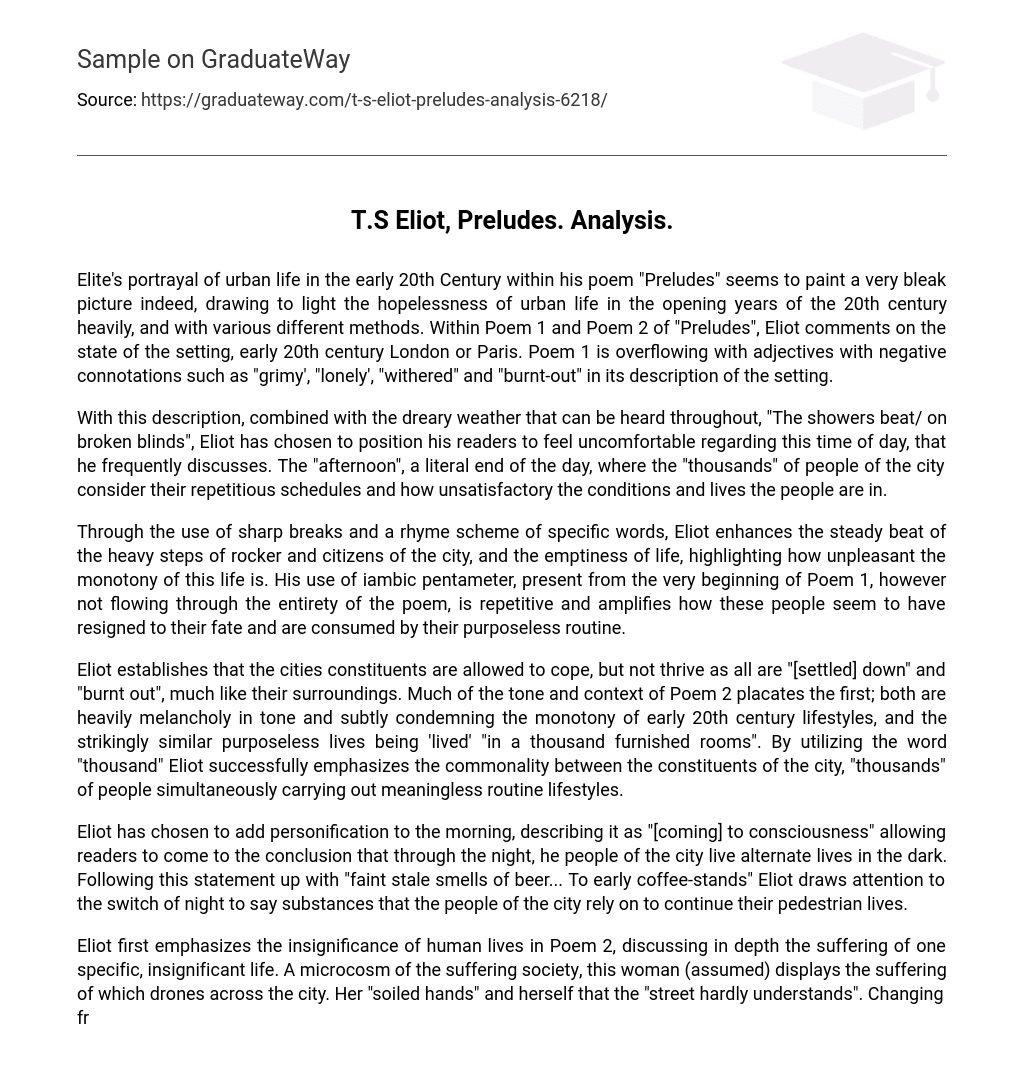Elite’s portrayal of urban life in the early 20th Century within his poem “Preludes” seems to paint a very bleak picture indeed, drawing to light the hopelessness of urban life in the opening years of the 20th century heavily, and with various different methods. Within Poem 1 and Poem 2 of “Preludes”, Eliot comments on the state of the setting, early 20th century London or Paris. Poem 1 is overflowing with adjectives with negative connotations such as “grimy’, “lonely’, “withered” and “burnt-out” in its description of the setting.
With this description, combined with the dreary weather that can be heard throughout, “The showers beat/ on broken blinds”, Eliot has chosen to position his readers to feel uncomfortable regarding this time of day, that he frequently discusses. The “afternoon”, a literal end of the day, where the “thousands” of people of the city consider their repetitious schedules and how unsatisfactory the conditions and lives the people are in.
Through the use of sharp breaks and a rhyme scheme of specific words, Eliot enhances the steady beat of the heavy steps of rocker and citizens of the city, and the emptiness of life, highlighting how unpleasant the monotony of this life is. His use of iambic pentameter, present from the very beginning of Poem 1, however not flowing through the entirety of the poem, is repetitive and amplifies how these people seem to have resigned to their fate and are consumed by their purposeless routine.
Eliot establishes that the cities constituents are allowed to cope, but not thrive as all are “[settled] down” and “burnt out”, much like their surroundings. Much of the tone and context of Poem 2 placates the first; both are heavily melancholy in tone and subtly condemning the monotony of early 20th century lifestyles, and the strikingly similar purposeless lives being ‘lived’ “in a thousand furnished rooms”. By utilizing the word “thousand” Eliot successfully emphasizes the commonality between the constituents of the city, “thousands” of people simultaneously carrying out meaningless routine lifestyles.
Eliot has chosen to add personification to the morning, describing it as “[coming] to consciousness” allowing readers to come to the conclusion that through the night, he people of the city live alternate lives in the dark. Following this statement up with “faint stale smells of beer… To early coffee-stands” Eliot draws attention to the switch of night to say substances that the people of the city rely on to continue their pedestrian lives.
Eliot first emphasizes the insignificance of human lives in Poem 2, discussing in depth the suffering of one specific, insignificant life. A microcosm of the suffering society, this woman (assumed) displays the suffering of which drones across the city. Her “soiled hands” and herself that the “street hardly understands”. Changing from first person narration to second person narration allows the readers to have a fully-fledged view of the desolate surroundings, establishing the wearisome repetition of the exact same lifestyle across the city in the statement “… Gassing dingy shades/in a thousand furnished rooms”, Eliot suggests that the suffering of individuals, is too big to see in an infinite world; the stories are gathered like firewood, and we are all forced to scavenge for our very existence: everyone’s existence is lonely against the pressing mass of humanity. This concept is further discussed in Poem 4 of “Preludes” as Eliot states how one man’s soul is “stretched T. S Eliot, Preludes. Analysis. By cauliflower insistent feet”. Throughout the entirety of “Preludes”, Eliot portrays urban life to be something very dirty and miserable – “sawdust-trampled street, with all its muddy feet that press to early morning coffee stands… ” The fact that the street in covered in sawdust shows that it is filthy, and the sawdust is there to absorb some of the filth. The people pressing to “early morning coffee stands,” The dirt seems to get everywhere; it is inescapable, and as such becomes a part of the people who work in the city’s very life.
In “Rhapsody on a Windy Night”, Eliot regards the urban night-life. Eliot is merely regarding, rather than interacting with the rather depressing and seedy urban night-life in this poem because it is a reflection of the social isolation and decay of the modernist era. Similarly to ‘Preludes”, at first glance, the title, “Rhapsody on a Windy Night” makes readers feel that the poem will be enthusiastic ND upbeat. However, the word “Rhapsody’ is highly ironic as the entirety of the poem is filled with a depressing and bleak tone.
This is effective as it creates suspense and a feeling of tragedy and suffering in the poem. Rhapsody, similar to music, can also mean an irregular and unstructured piece, which reflects the poem’s form and theme. However, “Night” leads to connotations of obscurity, unconsciousness, oblivion and ignorance, which reflects the theme of isolation and a decaying society. Elite’s portrayal of urban life in the Early 20th Century further, in moon with “Preludes” paints a very bleak picture. Along the reaches of the street, held in lunar synthesis” is frightening imagery-inanimate objects appear to come to life, in the “lunar synthesis” – the word “synthesis” suggesting a creation of some sort, but a weird creation, one of the moon. Within themes of a desolate society in which the focus character cannot connect with, “The Love Song of J Alfred Froufrou” is much alike with “Preludes”





